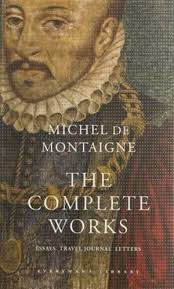Essays of Michel de Montaigne Page #13
The Essays of Michel de Montaigne are contained in three books and 107 chapters of varying length. They were originally written in Middle French and were originally published in the Kingdom of France.
The exactly regulated movements of his mind, his piety, his virtue, his justice, his vivacity, the solidity and soundness of his judgment, the loftiness of his ideas, raised so far above the common level, his learning, the grace which accompanied his most ordinary actions, the tender affection he had for his miserable country, and his supreme and sworn detestation of all vice, but principally of that villainous traffic which disguises itself under the honourable name of justice, should certainly impress all well-disposed persons with a singular love towards him, and an extraordinary regret for his loss. But, sir, I am unable to do justice to all these qualities; and of the fruit of his own studies it had not entered into his mind to leave any proof to posterity; all that remains, is the little which, as a pastime, he did at intervals. However this may be, I beg you, sir, to receive it kindly; and as our judgment of great things is many times formed from lesser things, and as even the recreations of illustrious men carry with them, to intelligent observers, some honourable traits of their origin, I would have you form from this, some knowledge of him, and hence lovingly cherish his name and his memory. In this, sir, you will only reciprocate the high opinion which he had of your virtue, and realise what he infinitely desired in his lifetime; for there was no one in the world in whose acquaintance and friendship he would have been so happy to see himself established, as in your own. But if any man is offended by the freedom which I use with the belongings of another, I can tell him that nothing which has been written or been laid down, even in the schools of philosophy, respecting the sacred duties and rights of friendship, could give an adequate idea of the relations which subsisted between this personage and myself. Moreover, sir, this slender gift, to make two throws of one stone at the same time, may likewise serve, if you please, to testify the honour and respect which I entertain for your ability and high qualities; for as to those gifts which are adventitious and accidental, it is not to my taste to take them into account. Sir, I pray God to grant you a very happy and a very long life. From Montaigne, this 30th of April 1570.--Your humble and obedient servant, MICHEL DE MONTAIGNE. To Monsieur, Monsieur de Folx, Privy Councillor, and Ambassador of His Majesty to the Signory of Venice.--[ Printed before the ‘Vers Francois’ of Etienne de la Boetie, 8vo, Paris, 1572.] SIR,--Being on the point of commending to you and to posterity the memory of the late Etienne de la Boetie, as well for his extreme virtue as for the singular affection which he bore to me, it struck me as an indiscretion very serious in its results, and meriting some coercion from our laws, the practice which often prevails of robbing virtue of glory, its faithful associate, in order to confer it, in accordance with our private interests and without discrimination, on the first comer; seeing that our two principal guiding reins are reward and punishment, which only touch us properly, and as men, through the medium of honour and dishonour, forasmuch as these penetrate the mind, and come home to our most intimate feelings: just where animals themselves are susceptible, more or less, to all other kinds of recompense and corporal chastisement. Moreover, it is well to notice that the custom of praising virtue, even in those who are no longer with us, impalpable as it is to them, serves as a stimulant to the living to imitate their example; just as capital sentences are carried out by the law, more for the sake of warning to others, than in relation to those who suffer. Now, commendation and its opposite being analogous as regards effects, we cannot easily deny the fact, that although the law prohibits one man from slandering the reputation of another, it does not prevent us from bestowing reputation without cause. This pernicious licence in respect to the distribution of praise, has formerly been confined in its area of operations; and it may be the reason why poetry once lost favour with the more judicious. However this may be, it cannot be concealed that the vice of falsehood is one very unbecoming in gentleman, let it assume what guise it will. As for that personage of whom I am speaking to you, sir he leads me far away indeed from this kind of language; for the danger in his case is not, lest I should lend him anything, but that I might take something from him; and it is his ill-fortune that, while he has supplied me, so far as ever a man could, with just and obvious opportunities for commendation, I find myself unable and unqualified to render it to him --I, who am his debtor for so many vivid communications, and who alone have it in my power to answer for a million of accomplishments, perfections, and virtues, latent (thanks to his unkind stars) in so noble a soul. For the nature of things having (I know not how) permitted that truth, fair and acceptable--as it may be of itself, is only embraced where there are arts of persuasion, to insinuate it into our minds, I see myself so wanting, both in authority to support my simple testimony, and in the eloquence requisite for lending it value and weight, that I was on the eve of relinquishing the task, having nothing of his which would enable me to exhibit to the world a proof of his genius and knowledge. In truth, sir, having been overtaken by his fate in the flower of his age, and in the full enjoyment of the most vigorous health, it had been his design to publish some day works which would have demonstrated to posterity what sort of a man he was; and, peradventure, he was indifferent enough to fame, having formed such a plan in his head, to proceed no further in it. But I have come to the conclusion, that it was far more excusable in him to bury with him all his rare endowments, than it would be on my part to bury also with me the knowledge of them which I had acquired from him; and, therefore, having collected with care all the remains which I found scattered here and there among his papers, I intend to distribute them so as to recommend his memory to as many persons as possible, selecting the most suitable and worthy of my acquaintance, and those whose testimony might do him greatest honour: such as you, sir, who may very possibly have had some knowledge of him during his life, but assuredly too slight to discover the perfect extent of his worth. Posterity may credit me, if it chooses, when I swear upon my conscience, that I knew and saw him to be such as, all things considered, I could neither desire nor imagine a genius surpassing his. I beg you very humbly, sir, not only to take his name under your general protection, but also these ten or twelve French stanzas, which lay themselves, as of necessity, under shadow of your patronage. For I will not disguise from you, that their publication was deferred, upon the appearance of his other writings, under the pretext (as it was alleged yonder at Paris) that they were too crude to come to light. You will judge, sir, how much truth there is in this; and since it is thought that hereabout nothing can be produced in our own dialect but what is barbarous and unpolished, it falls to you, who, besides your rank as the first house in Guienne, indeed down from your ancestors, possess every other sort of qualification, to establish, not merely by your example, but by your authoritative testimony, that such is not always the case: the more so that, though ‘tis more natural with the Gascons to act than talk, yet sometimes they employ the tongue more than the arm, and wit in place of valour.
Translation
Translate and read this book in other languages:
Select another language:
- - Select -
- 简体中文 (Chinese - Simplified)
- 繁體中文 (Chinese - Traditional)
- Español (Spanish)
- Esperanto (Esperanto)
- 日本語 (Japanese)
- Português (Portuguese)
- Deutsch (German)
- العربية (Arabic)
- Français (French)
- Русский (Russian)
- ಕನ್ನಡ (Kannada)
- 한국어 (Korean)
- עברית (Hebrew)
- Gaeilge (Irish)
- Українська (Ukrainian)
- اردو (Urdu)
- Magyar (Hungarian)
- मानक हिन्दी (Hindi)
- Indonesia (Indonesian)
- Italiano (Italian)
- தமிழ் (Tamil)
- Türkçe (Turkish)
- తెలుగు (Telugu)
- ภาษาไทย (Thai)
- Tiếng Việt (Vietnamese)
- Čeština (Czech)
- Polski (Polish)
- Bahasa Indonesia (Indonesian)
- Românește (Romanian)
- Nederlands (Dutch)
- Ελληνικά (Greek)
- Latinum (Latin)
- Svenska (Swedish)
- Dansk (Danish)
- Suomi (Finnish)
- فارسی (Persian)
- ייִדיש (Yiddish)
- հայերեն (Armenian)
- Norsk (Norwegian)
- English (English)
Citation
Use the citation below to add this book to your bibliography:
Style:MLAChicagoAPA
"Essays of Michel de Montaigne Books." Literature.com. STANDS4 LLC, 2025. Web. 31 Jan. 2025. <https://www.literature.com/book/essays_of_michel_de_montaigne_263>.








Discuss this Essays of Michel de Montaigne book with the community:
Report Comment
We're doing our best to make sure our content is useful, accurate and safe.
If by any chance you spot an inappropriate comment while navigating through our website please use this form to let us know, and we'll take care of it shortly.
Attachment
You need to be logged in to favorite.
Log In